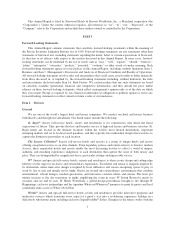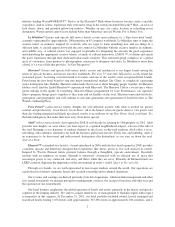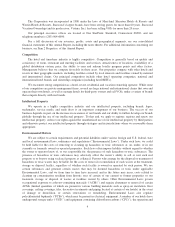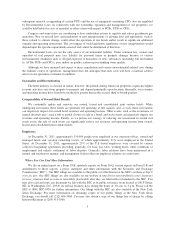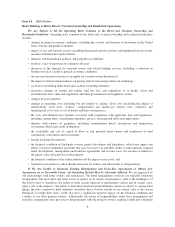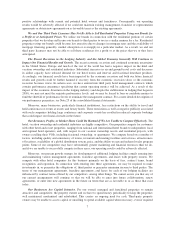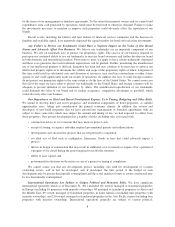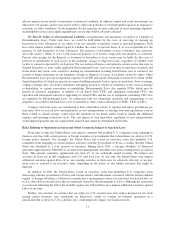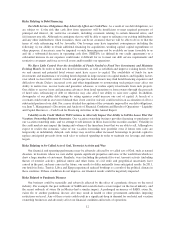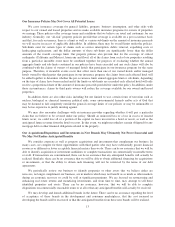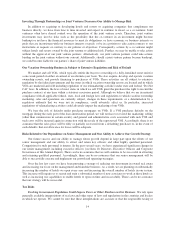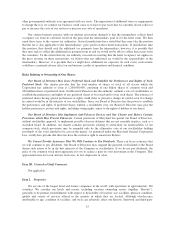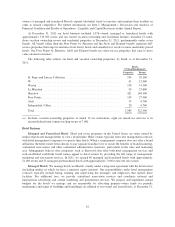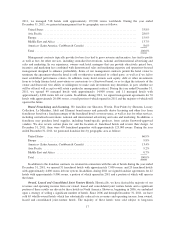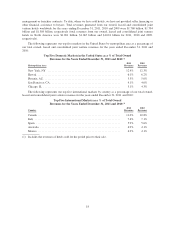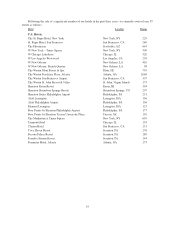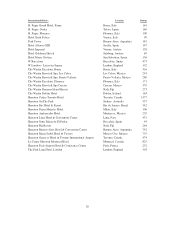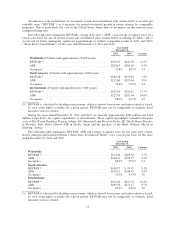Starwood 2011 Annual Report Download - page 79
Download and view the complete annual report
Please find page 79 of the 2011 Starwood annual report below. You can navigate through the pages in the report by either clicking on the pages listed below, or by using the keyword search tool below to find specific information within the annual report.adverse impact on our results of operations or financial condition. In addition, equity real estate investments are
difficult to sell quickly and we may not be able to adjust our portfolio of owned properties quickly in response to
economic or other conditions. If our properties do not generate revenue sufficient to meet operating expenses,
including debt service and capital expenditures, our income will be adversely affected.
We May Be Subject to Environmental Liabilities. Our properties and operations are subject to a number of
Environmental Laws. Under such laws, we could be held liable for the costs of removing or cleaning up
hazardous or toxic substances at, on, under, or in our currently or formerly owned or operated properties. Such
laws often impose liability without regard to whether the owner or operator knew of, or was responsible for, the
presence of such hazardous or toxic substances. The presence of hazardous or toxic substances may adversely
affect the owner’s ability to sell or rent such real property or to borrow using such real property as collateral.
Persons who arrange for the disposal or treatment of hazardous or toxic wastes may be liable for the costs of
removal or remediation of such wastes at the treatment, storage or disposal facility, regardless of whether such
facility is owned or operated by such person. We use certain substances and generate certain wastes that may be
deemed hazardous or toxic under applicable Environmental Laws, and we from time to time have incurred, and
in the future may incur, costs related to cleaning up contamination resulting from historic uses at certain of our
current or former properties or our treatment, storage or disposal of wastes at facilities owned by others. Other
Environmental Laws govern occupational exposure to ACMs and require abatement or removal of certain ACMs
(limited quantities of which are present in various building materials such as spray-on insulation, floor coverings,
ceiling coverings, tiles, decorative treatments and piping located at certain of our hotels) in the event of damage
or demolition, or certain renovations or remodeling. Environmental Laws also regulate PCBs, which may be
present in electrical equipment. A number of our hotels have USTs and equipment containing CFCs; the
operation and subsequent removal or upgrading of certain USTs and the use of equipment containing CFCs also
are regulated by Environmental Laws. In connection with our ownership, operation and management of our
properties, we could be held liable for costs of remedial or other action with respect to PCBs, USTs or CFCs.
Congress and some states are considering or have undertaken actions to regulate and reduce greenhouse gas
emissions. New or revised laws and regulations or new interpretations of existing laws and regulations, such as
those related to climate change, could affect the operation of our hotels and/or result in significant additional
expense and operating restrictions on us. The cost impact of such legislation, regulation, or new interpretations
would depend upon the specific requirements enacted and cannot be determined at this time.
Risks Relating to Operations in Syria and Other Countries Subject to Sanction Laws
From time to time the United States may impose sanctions that prohibit U.S. companies from engaging in
business activities with certain persons or foreign countries or governments that it determines are adverse to U.S.
foreign policy interests. For example, the United States has issued an executive order that prohibits U.S.
companies from engaging in certain business activities with the government of Syria, a country that the United
States has identified as a state sponsor of terrorism. During fiscal 2011, a foreign subsidiary of Starwood
generated approximately $300,000 of revenue from management and other fees from existing hotels located in
Syria. This amount constitutes significantly less than 1% of our worldwide annual revenues. We believe our
activities in Syria are in full compliance with U.S. and local law. At any time, the United States may impose
additional sanctions against Syria. If so, our existing activities in Syria may be adversely affected, or we may
incur costs to respond to an executive order, depending on the nature of any further sanctions that might be
imposed.
In addition, in 2011 the United States issued an executive order that prohibited U.S. companies from
transacting with the government of Libya and certain entities and individuals associated with the former Gaddafi
regime. A foreign subsidiary of Starwood currently has a management contract for one hotel located in Libya, as
well as three hotels outside Libya that are indirectly owned by the government of Libya. Although the restriction
was released following the fall of the Gaddafi regime, the United States may impose additional sanctions against
Libya at any time.
Further, our activities in countries that are subject to U.S. sanction laws may reduce demand for our stock
among certain investors. Any restrictions on Starwood’s ability to conduct its business operations in a
jurisdiction that is subject to U.S. sanctions laws could negatively impact our financial results.
11


